人教版丨八年级下册英语3单元知识点总结
人教版八年级下册英语unit-3知识点汇总

人教版八年级下册英语unit-3知识点汇总Title: A Comprehensive Review of Unit 3 from the 8thGrade English TextbookUnit 3 of the 8th grade English textbook covers a wide range of topics and language skills. In this summary, we will explore the key knowledge points and content covered in this unit.Vocabulary:The vocabulary section in this unit focuses on words related to the theme of "Fashion and Shopping." Some of thekey words and phrases include:- Clothing items: t-shirt, skirt, jeans, jacket, dress, suit, etc.- Accessories: hat, scarf, belt, sunglasses, jewelry, etc.- Adjectives to describe clothing: stylish, casual, formal, comfortable, expensive, cheap, etc.- Verbs related to shopping: try on, buy, sell, return, exchange, etc.- Useful expressions: "How much is it?", "It fits me well.", "I'd like to try this on.", etc.Students are expected to learn the spelling, pronunciation, and meanings of these vocabulary items, as well as how to use them in appropriate contexts.Grammar:The grammar focus in this unit revolves around the following topics:1. Comparison of Adjectives:- Forming comparative and superlative adjectives (e.g., more/less + adjective, adjective + -er/-est)- Using "as ... as" to make comparisons- Irregular comparative and superlative forms (e.g., good/better/best, bad/worse/worst)2. Modals:- Using modal verbs such as "can," "could," "should," "would," and "might" to express ability, possibility, obligation, and suggestion3. Present Perfect Tense:- Forming the present perfect tense using "have/has + past participle"- Differentiating the present perfect from the simple past tense- Using the present perfect to talk about experiences and recent events4. Reported Speech:- Changing direct speech (quotations) into reported speech (e.g., "She said, 'I'm going to the mall.'" becomes "She said she was going to the mall.")- Shifting tenses and pronouns when converting direct speech to reported speechStudents will learn to apply these grammar concepts accurately in their speaking and writing.Reading Comprehension:The reading texts in this unit cover various topics related to fashion and shopping, such as:1. A magazine article about the latest trends in fashion2. A dialogue between two friends discussing their shopping experiences3. A blog post about a visit to a local clothing store4. An informative text about the history of a famous fashion brandStudents are expected to read these texts carefully, understand the main ideas and key details, and answer comprehension questions. They will also practice identifying the author's purpose, making inferences, and drawing conclusions based on the information provided.Writing:The writing tasks in this unit focus on the following genres:1. Descriptive Writing:- Describing an outfit or a favorite piece of clothing in detail, using vivid language and relevant vocabulary2. Narrative Writing:- Telling a story about a memorable shopping experience, including relevant details and dialogue3. Persuasive Writing:- Composing an opinion essay arguing for or against a particular fashion trend or clothing styleStudents will learn to organize their ideas, use appropriate language and sentence structures, and develop their writing skills through these various writing assignments.Listening and Speaking:The listening and speaking activities in this unit cover the following:1. Dialogues and Conversations:- Listening to and participating in conversations about fashion and shopping, such as discussions about clothing preferences, shopping experiences, and making purchasing decisions2. Presentations and Interviews:- Preparing and delivering short presentations onfashion-related topics- Practicing interview skills by asking and answering questions about clothing and shopping habits3. Role-playing and Simulations:- Engaging in role-play scenarios, such as a customer interacting with a store clerk or two friends shopping togetherThese activities aim to improve students' listening comprehension, oral communication skills, and overall fluency in English.In conclusion, Unit 3 of the 8th grade English textbook provides a comprehensive exploration of vocabulary, grammar, reading, writing, listening, and speaking skills related to the theme of "Fashion and Shopping." By mastering the content and skills covered in this unit, students will be betterequipped to communicate effectively in various real-world situations involving fashion and shopping.。
人教版八年级下册英语第三单元知识点
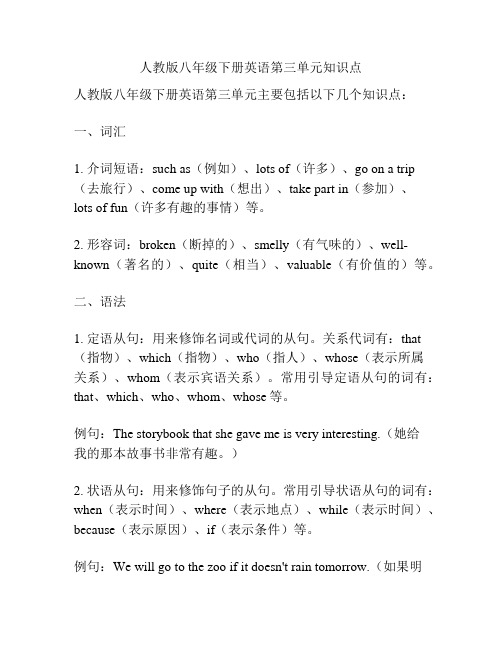
人教版八年级下册英语第三单元知识点人教版八年级下册英语第三单元主要包括以下几个知识点:一、词汇1. 介词短语:such as(例如)、lots of(许多)、go on a trip (去旅行)、come up with(想出)、take part in(参加)、lots of fun(许多有趣的事情)等。
2. 形容词:broken(断掉的)、smelly(有气味的)、well-known(著名的)、quite(相当)、valuable(有价值的)等。
二、语法1. 定语从句:用来修饰名词或代词的从句。
关系代词有:that (指物)、which(指物)、who(指人)、whose(表示所属关系)、whom(表示宾语关系)。
常用引导定语从句的词有:that、which、who、whom、whose等。
例句:The storybook that she gave me is very interesting.(她给我的那本故事书非常有趣。
)2. 状语从句:用来修饰句子的从句。
常用引导状语从句的词有:when(表示时间)、where(表示地点)、while(表示时间)、because(表示原因)、if(表示条件)等。
例句:We will go to the zoo if it doesn't rain tomorrow.(如果明天不下雨,我们会去动物园。
)3. 强调句型:强调句型是通过使用强调副词或者借助强调式动词来强调某一部分内容。
例句:It was Alice who won the first prize in the speech contest.(是爱丽丝在演讲比赛中获得了第一名。
)三、阅读技巧1. 根据上下文推测词义:通过上下文的提示来推测生词的词义。
2. 找出关键句:在一篇文章中,找出关键句可以帮助我们更好地理解文章的主旨。
3. 圈点标记:在阅读过程中进行圈点标记,可以帮助我们更好地理解文章,并且方便日后复习。
人教版英语八年级下册第三单元知识点归纳
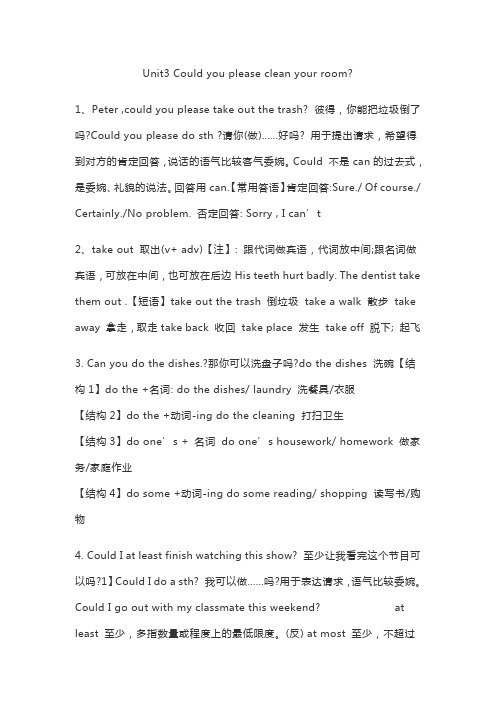
Unit3 Could you please clean your room?1、Peter ,could you please take out the trash? 彼得,你能把垃圾倒了吗?Could you please do sth ?请你(做)......好吗? 用于提出请求,希望得到对方的肯定回答,说话的语气比较客气委婉。
Could 不是can的过去式,是委婉、礼貌的说法。
回答用can.【常用答语】肯定回答:Sure./ Of course./ Certainly./No problem. 否定回答: Sorry , I can’t2、take out 取出(v+ adv)【注】: 跟代词做宾语,代词放中间;跟名词做宾语,可放在中间,也可放在后边His teeth hurt badly. The dentist take them out .【短语】take out the trash 倒垃圾take a walk 散步take away 拿走,取走take back 收回take place 发生take off 脱下; 起飞3.Can you do the dishes.?那你可以洗盘子吗?do the dishes 洗碗【结构1】do the +名词: do the dishes/ laundry 洗餐具/衣服【结构2】do the +动词-ing do the cleaning 打扫卫生【结构3】do one’s + 名词do one’s housework/ homework 做家务/家庭作业【结构4】do some +动词-ing do some reading/ shopping 读写书/购物4.Could I at least finish watching this show? 至少让我看完这个节目可以吗?1】Could I do a sth? 我可以做......吗?用于表达请求,语气比较委婉。
八年级人教版英语下册unit3知识点

八年级人教版英语下册unit3知识点Unit 3 Language in use一、句型结构1. What did you do…?A: What did you do yesterday?B: I cleaned my room.2. What was …like?A: What was the weather like yesterday?B: It was warm and sunny.3. When did …?A: When did you finish your homework?B: I finished it at nine o’clock last night.4. How was …?A: How was your weekend?B: It was great! I went to the park and played basketball with my friends.二、动词时态1. 一般过去时:表示过去经历或已经完成的动作或状态。
I walked to school yesterday.She watched a movie last night.2. 过去进行时:表示过去某一时刻正在进行的动作。
We were playing basketball at six o’clock yesterday evening.They were studying English when the teacher came in.3. 过去完成时:表示过去的某个时间或动作之前已经完成的动作。
He had finished his homework before he went to bed.I had never been to Shanghai before last year.三、被动语态被动语态的构成:be动词(am、is、are、was、were)+过去分词。
1. 一般现在时被动语态:The apples are picked by the farmers.2. 一般过去时被动语态:The book was written by Li Bai.3. 现在进行时被动语态:The dishes are being washed by my sister.四、语态转换主动语态变被动语态,被动语态变主动语态。
英语八年级下(人教版)第三单元重点知识总结
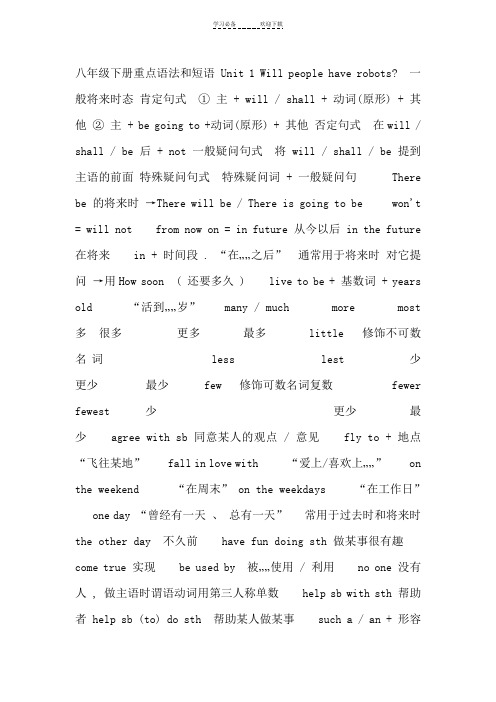
八年级下册重点语法和短语 Unit 1 Will people have robots? 一般将来时态肯定句式主 + will / shall + 动词(原形) + 其他②主 + be going to +动词(原形) + 其他否定句式will /shall / be 后 + not 一般疑问句式will / shall / be 提到主语的前面特殊疑问句式 + 一般疑问句 Therebe 的将来时→There will be / There is going to be won't= will not from now on = in future 从今以后 in the future在将来 in + 时间段 . “在……之后”通常用于将来时对它提问→用How soon ( 还要多久 ) live to be + 基数词 + yearsold “活到……岁” many / much more most 多更多最多 littleless lest 少更少最少 few fewer fewest 少更少最少 agree with sb 同意某人的观点 / 意见 fly to + 地点“飞往某地” fall in love with “爱上/喜欢上……” onthe weekend “在周末” on the weekdays “在工作日”one day “曾经有一天、总有一天”the other day 不久前 have fun doing sth 做某事很有趣come true 实现 be used by 被……使用 / 利用 no one 没有人 , 做主语时谓语动词用第三人称单数 help sb with sth 帮助者 help sb (to) do sth 帮助某人做某事 such a / an + 形容词 + 可数名词单数“如此 / 这样的一个……” try to dosth 尽力做某事 try doing sth 尝试做某事 be able to dosth. = can do sth能够做某事 hundreds of 数以百计的 ,大量的 thousands of 数以千计的 look for 寻找the same as 和……一样 be different from 和……不同 It is + 形容词 + for sb to do sth Wake up 醒来 Make sb do sth 让某人做某事Unit 2 What should I do? 重点语法should ,would都可以用来提出建议 Should / would +动词原形“应该 / 可以做……”重点短语 1、 be in style 流行的 be out of style 过时了 2、 write sb a letter =write a letter to sb 给某人写一封信 3、 call sb up 给某人打电话 = make a call to sb 4、be surprised at……对……感到吃惊、 to one’s surprise, 使某人吃惊的是…… 5、argue with sb 与某人争论 / 辩论 argue about sth 为某事争论 6、pay for sth 支付 sb pay + 钱for sth 某人花了多少钱买…… 7、have no idea 不知道 8、borrow sth from sb 向某人借东西 lend sth to sb 把某物借给某人 9、ask sb for sth 向某人要…… ask sb todo sth. 请求某人做某事 ask sb not to do s th. 请求某人不要做某事 10、buy sb sth = buy sth for sb 给某人买某物 11、 the same + 名词 + as 和……一样…… thesame as 和……一样 be different from 与……不同12、be popular with 受……的欢迎 13、find out 找出look for 寻找 14、invite sb to do sth 邀请某人做某事 15、be angry with sb 对某人生气 be angry at sth 对某事生气 16、get on well with sb / sth 与……相处得好7、have a fight with sb 和某人打架 18、give sb some advice 给某人一些建议 19、not …… untill 直到……才 20、 fit ……into 安排时间做…… 21、complain about doing sth 抱怨做…… 22、compare A with B 把A和B相比 compare A to B 把A比作 B 23、all kinds of 各种各样的 24、on the one hand , on the other hand , ……。
人教版八年级英语下册Unit3短语归纳+重点考点总结
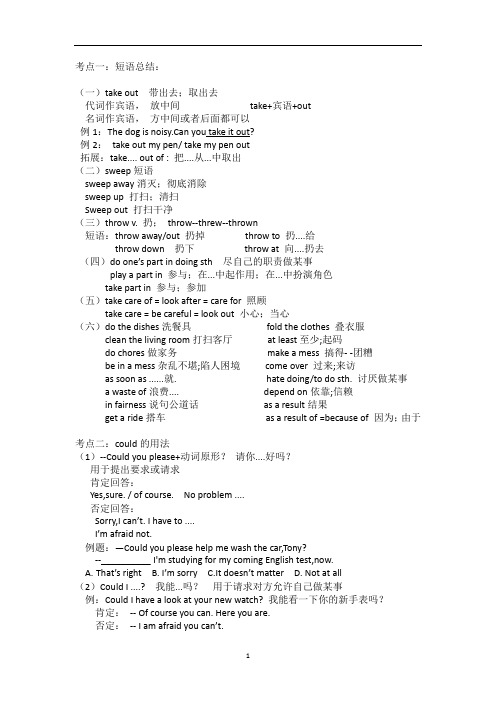
考点一:短语总结:(一)take out 带出去;取出去代词作宾语,放中间take+宾语+out名词作宾语,方中间或者后面都可以例1:The dog is noisy.Can you take it out?例2:take out my pen/ take my pen out拓展:take.... out of : 把....从...中取出(二)sweep短语sweep away消灭;彻底消除sweep up 打扫;清扫Sweep out 打扫干净(三)throw v. 扔;throw--threw--thrown短语:throw away/out 扔掉throw to 扔....给throw down 扔下throw at 向....扔去(四)do one’s part in doing sth 尽自己的职责做某事play a part in 参与;在...中起作用;在...中扮演角色take part in 参与;参加(五)take care of = look after = care for 照顾take care = be careful = look out 小心;当心(六)do the dishes洗餐具fold the clothes 叠衣服clean the living room打扫客厅at least至少;起码do chores做家务make a mess 搞得--团糟be in a mess杂乱不堪;陷人困境come over 过来;来访as soon as ......就. hate doing/to do sth. 讨厌做某事a waste of浪费.... depend on依靠;信赖in fairness说句公道话as a result结果get a ride搭车as a result of =because of 因为;由于考点二:could的用法(1)--Could you please+动词原形?请你....好吗?用于提出要求或请求肯定回答:Yes,sure. / of course. No problem ....否定回答:Sorry,I can’t. I have to ....I’m afraid not.例题:—Could you please help me wash the car,Tony?--__________ I'm studying for my coming English test,now.A.That’s rightB. I’m sorryC.It doesn’t matterD. Not at all(2)Could I ....? 我能...吗?用于请求对方允许自己做某事例:Could I have a look at your new watch? 我能看一下你的新手表吗?肯定:-- Of course you can. Here you are.否定:-- I am afraid you can’t.(3)表示能力Could表示过去的能力,can表示现在的能力can--couldCould you speak English then?那时候你会说英文吗?例题:1.-- ______you give me a hand? I can’t move the box by myself.-- No problem.A.CouldB. ShouldC.MustD. Need2.Li Ming_______speak two languages when he was eight years old.A.mayB. canC. can'tD. could考点三:1.复数名词(短语)作主语用法表示时间、重量、距离、价格等的复数名词(短语)作主语,谓语动词一般用单数形式ten minutes/ four thousand dollars ..做主语例题:For kids of this age, two hours of sitting in a classroom______too long.A.isB.areC. wasD.were考点四:For one week,she didn’t do any housework and neither didi I.(1)neither/nor +be动词/助动词/情态动词+主语结构“也不....’’ 注意:Me neither. 不能说Me nor.(2)作代词,"两者都不"neither of 结构作主语时,谓语动词用单数Neither of them has a car. 他们两个都没有汽车。
人教版八年级下册英语第三单元知识点

人教版八年级下册英语第三单元知识点Unit 3 Could you please clean your room?一、重点短语1.go out for dinner出去吃饭2.stay out late在外面待到很晚3.go to the movies去看电影4.geta ride搭车5.work on从事6.cleanand tidy干净洁7.do the dishes洗餐具8.takeout the rubbish倒垃圾9.fold your/the clothes叠衣服10.sweepthe floor扫地11.make your/the bed整理床铺12.cleanthe living room打扫客厅13.no problem没问题14.welcomesb.欢迎某人e home fro m school/work放学/下班回家16.throw down扔下17.sit down坐下eover过来19.take sb.for a walk带某人去散步20.all the time总是21.all day/evening整日/夜22.dohousework做家务23.shout back大声回应24.walkaway走开25.a comfortable home一个舒适的家26.share the housework分担家务27.get some thing to drink拿点喝的东西28.insurprise惊讶地29.watch one show观看节目30.hangout闲逛31.pass sb.sth.把某物传给某人32.lend sb.sth.把某物借给某人33.get sth.wet使某物弄湿34.hate to do sth.讨厌做某事35.help sb.to do/with sth帮助某人干某事36.do chores做杂务37.bring a tent带顶帐篷来38.buy some snacks买些小吃39.invite sb to a party邀请某人参加聚会40.go to the store去商店41.make sb.do sth使某人做某事42.enough stress足够的压力43.a waste of time浪费时间44.inorder to为了45.get goodgrades取得好成绩46.minddoing sth.介意做某事47.developchildren’s independence发展孩子的独立性48.dependon依赖49.do ones part in(doing)sth.做某人分内的事50.look after/take care of 照顾;51.finish doing sth.完成做某事二、知识点解析1.“Could you please do sth.?”的答语以下两种情况:接受请求时可以用Yes,sure./Sure./Of course./Certainly./No problem./My pleasure./It’s my pleasure./With pleasure.等来回答拒绝请求时可以用Sorry./Sorry,I can’t.等来回答,还可以用Ihave to do sth.来解释其否定句是:“Could youplease not do sth.?”2.有关“家务劳动”有关的短语:takeout the rubbish/trash倒垃圾foldone’s clothes叠衣服sweepthe floor扫地cleanthe room打扫房间makeone’s/the bed铺床dothe dishes/wash the dishes洗餐具3.throw down扔下throwat扔向,掷向throw away扔掉例题:Recycling is good,so don’t__________bottles or newspapers.A.find outB.hand ine upD.throw away4.the minute表示“一…….就……”,相当于as soon as.(引导时间状语从句)e.g.:I’ll tell himthe minute he gets there.5.常见time的短语:all the time一直,总是at times不时,有时in time及时on time按时forthe first time第一次in no time立刻at any time随时bythe time到...的时候atthe same同时have a good/great/wonderful time玩的愉快例题:---Hurry up.It’s almost time for school.---Don’t worry.We are sure to be atschool__________.A.at timesB.on timeC.all the timeD.by the time6.as….as表示“和……一样”,之间要用形容词或副词的原级。
人教版八年级下册英语Unit3重点知识汇总
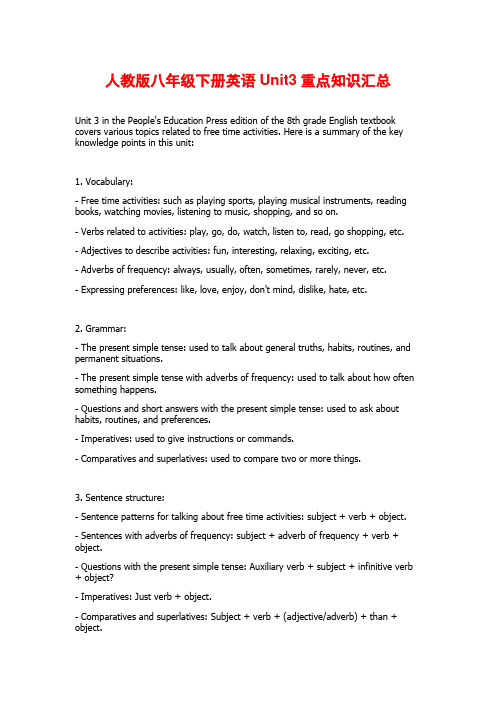
人教版八年级下册英语Unit3重点知识汇总Unit 3 in the People's Education Press edition of the 8th grade English textbook covers various topics related to free time activities. Here is a summary of the key knowledge points in this unit:1. Vocabulary:- Free time activities: such as playing sports, playing musical instruments, reading books, watching movies, listening to music, shopping, and so on.- Verbs related to activities: play, go, do, watch, listen to, read, go shopping, etc. - Adjectives to describe activities: fun, interesting, relaxing, exciting, etc.- Adverbs of frequency: always, usually, often, sometimes, rarely, never, etc.- Expressing preferences: like, love, enjoy, don't mind, dislike, hate, etc.2. Grammar:- The present simple tense: used to talk about general truths, habits, routines, and permanent situations.- The present simple tense with adverbs of frequency: used to talk about how often something happens.- Questions and short answers with the present simple tense: used to ask about habits, routines, and preferences.- Imperatives: used to give instructions or commands.- Comparatives and superlatives: used to compare two or more things.3. Sentence structure:- Sentence patterns for talking about free time activities: subject + verb + object. - Sentences with adverbs of frequency: subject + adverb of frequency + verb + object.- Questions with the present simple tense: Auxiliary verb + subject + infinitive verb + object?- Imperatives: Just verb + object.- Comparatives and superlatives: Subject + verb + (adjective/adverb) + than + object.4. Listening and speaking skills:- Listening for specific information: listening for details about someone's free time activities.- Speaking about preferences: expressing likes and dislikes about free time activities.5. Reading skills:- Reading for main ideas: skimming a text to understand the overall topic.- Reading for details: scanning a text to find specific information.It's important to review and practice these key knowledge points through various activities, such as completing exercises, having conversations, and reading and listening to texts in order to reinforce understanding and improve language skills.。
最新人教版八年级英语下册第三单元知识点汇总
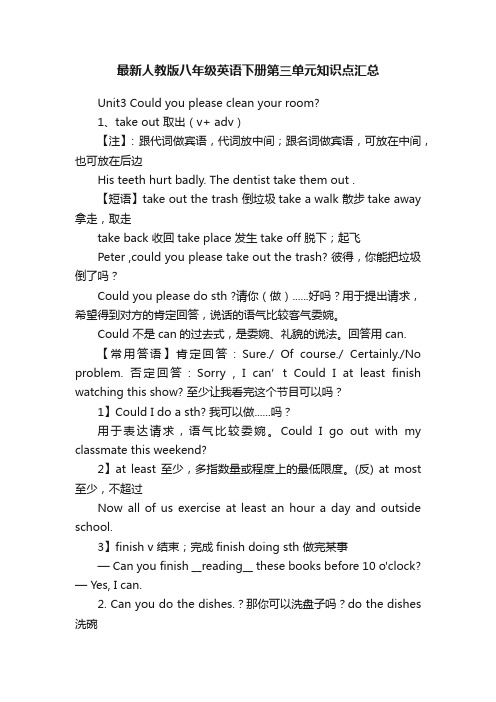
最新人教版八年级英语下册第三单元知识点汇总Unit3 Could you please clean your room?1、take out 取出(v+ adv)【注】: 跟代词做宾语,代词放中间;跟名词做宾语,可放在中间,也可放在后边His teeth hurt badly. The dentist take them out .【短语】take out the trash 倒垃圾take a walk 散步take away 拿走,取走take back 收回take place 发生take off 脱下;起飞Peter ,could you please take out the trash? 彼得,你能把垃圾倒了吗?Could you please do sth ?请你(做)......好吗?用于提出请求,希望得到对方的肯定回答,说话的语气比较客气委婉。
Could 不是can的过去式,是委婉、礼貌的说法。
回答用can.【常用答语】肯定回答:Sure./ Of course./ Certainly./No problem. 否定回答:Sorry , I can’t Could I at least finish watching this show? 至少让我看完这个节目可以吗?1】Could I do a sth? 我可以做......吗?用于表达请求,语气比较委婉。
Could I go out with my classmate this weekend?2】at least 至少,多指数量或程度上的最低限度。
(反) at most 至少,不超过Now all of us exercise at least an hour a day and outside school.3】finish v 结束;完成finish doing sth 做完某事— Can you finish __reading__ these books before 10 o'clock? — Yes, I can.2. Can you do the dishes.?那你可以洗盘子吗?do the dishes 洗碗【结构1】do the +名词:do the dishes/ laundry 洗餐具/衣服【结构2】do the +动词-ing do the cleaning 打扫卫生【结构3】do one’s + 名词do one’s housework/ homework 做家务/家庭作业【结构4】do some +动词-ing do some reading/ shopping 读写书/购物3、Could you take out the rubbish,fold the clothes and do the dishes?你能把垃圾倒了。
人教版八年级下册英语 Unit 3 单元知识点总结(含练习题及答案)
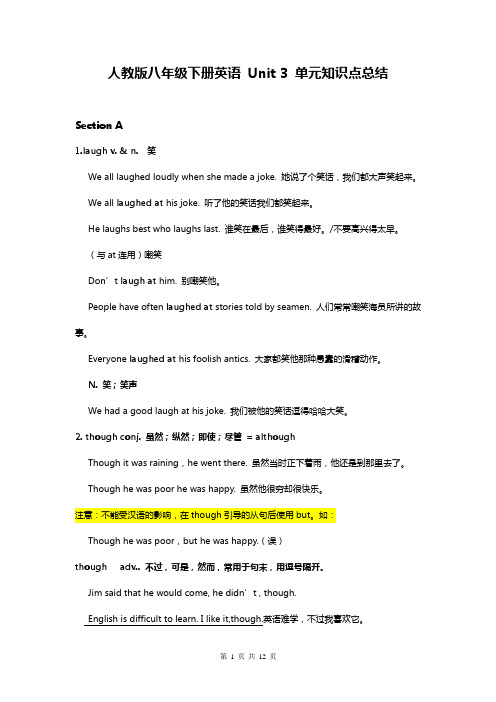
人教版八年级下册英语Unit 3 单元知识点总结Section Augh v. & n. 笑We all laughed loudly when she made a joke. 她说了个笑话,我们都大声笑起来。
We all laughed at his joke. 听了他的笑话我们都笑起来。
He laughs best who laughs last. 谁笑在最后,谁笑得最好。
/不要高兴得太早。
(与at连用)嘲笑Don’t laugh at him. 别嘲笑他。
People have often laughed at stories told by seamen. 人们常常嘲笑海员所讲的故事。
Everyone laughed at his foolish antics. 大家都笑他那种愚蠢的滑稽动作。
N. 笑;笑声We had a good laugh at his joke. 我们被他的笑话逗得哈哈大笑。
2. though conj. 虽然;纵然;即使;尽管= althoughThough it was raining,he went there. 虽然当时正下着雨,他还是到那里去了。
Though he was poor he was happy. 虽然他很穷却很快乐。
注意:不能受汉语的影响,在though引导的从句后使用but。
如:Though he was poor,but he was happy.(误)though adv.. 不过,可是,然而,常用于句末,用逗号隔开。
Jim said that he would come, he didn’t , though.English is difficult to learn. I like it,though.英语难学,不过我喜欢它。
3. quietly轻声地,安静地,平静地quiet轻声的,安静的,平静的The students walked to a quiet place.同学们向一个安静的地方走去。
(完整版)人教版部编版八年级下册英语第三单元复习知识点梳理

(完整版)人教版部编版八年级下册英语第三单元复习知识点梳理
1. 语法知识点
- 一般现在时:表示经常性动作或现在的状态
- 一般过去时:表示过去发生或存在的动作或状态
- 现在进行时:表示现在正在进行的动作
- 过去进行时:表示过去某一时刻正在进行的动作
- 现在完成时:表示过去某一时刻发生的动作对现在产生的影响
- 过去完成时:表示过去某一时刻之前已完成的动作
2. 词汇知识点
- 动词的不定式
- 预先研究一些常见的动词短语
- 研究动词的过去分词形式
- 研究一些常见的形容词和副词
3. 句型知识点
- 肯定句:主语 + 动词 + 其他成分
- 否定句:主语 + 动词 + not + 其他成分
- 一般疑问句:助动词/系动词 + 主语 + 动词 + 其他成分?
- 特殊疑问句:疑问词 + 一般疑问句
4. 对话和情景交际
研究并熟悉课本中的对话和情景交际,理解对话中的语言表达和交流。
5. 阅读理解
通过阅读短文,理解文章大意,研究并掌握一些常见的词汇和表达方式。
6. 写作技巧
- 研究常用句式和表达方式
- 练写一些简短的句子和段落
- 注意语法和拼写错误的纠正
以上是人教版部编版八年级下册英语第三单元的复知识点梳理,希望对你的研究有所帮助。
*注意:此文档梳理的内容来源于人教版部编版八年级下册英
语教材,仅供参考学习使用。
*。
人教版八年级下册英语Unit3知识点总结

人教版八年级下册英语Unit3知识点总结Unit3 Could you please clean your room?一.情态动词could的用法用于提出请求,希望得到对方的肯定回答,说话的语气比较客气委婉。
Could不是can的过去式,是委婉、礼貌的说法。
回答用can.肯定回答:Yes,sure./Yes,Ican./Ofcourse,XXX .否定回答:Sorry , I can’t / I’m afraid I can’t. I have to…,I’m going to…(说明理由)肯定回答:Yes, you can ./ Yes ,please / Of course/ Certainly./ No problem.否定回答:Sorry , you can’t / I’m afraid you can’t.3.could为XXX的曩昔式,透露表现曩昔的本领。
= was / were able toSection A1.XXX out the XXX把垃圾带出去2.do the dishes = wash the dishes洗碗碟3.fold your XXX折衣服4.sweep the floor扫地5.make your bed收拾整顿床铺6.clean the living room打扫起居室7.do XXX洗衣服/购物/做清洁8.go out for XXX出去吃晚饭9.go to the XXX去看片子10.XXX nine呆到很晚/呆到9点钟11.get a ride撘车12.give sb a ride to town开车送sb到镇上13.need to do something需求做……14.have to do something不能不做……15.help out with a few XXX帮助做些工作16.at least至少,多指数量或程度上的最低限度。
(反) at most至多,不超过17.finish doing something完成做……18.two hours of TV两个小时的电视表示时间、距离、金额、度量等词语作主语时,被视作整体,谓动用单数。
人教版八年级英语下册第三单元知识点总结

--------------------------------------------------------- 人教版八年级下册英语第三单元知识点总结 短语归纳(学生必背内容)1.do the dishes 洗餐具2.take out the rubbish 倒垃圾3.fold the clothes 叠衣服4.sweep the floor 扫地5.make the bed 铺床6.work on 从事;创作7.clean the living room 打扫起居室 8.go out 出去9.stay out 待在外面;不在家 10.help out 帮助做完某事 11.in front of 在....前面e over 过来;顺便来访 13.hang out 闲逛 14.do chores 做家务 15.at least 至少 16.throw down 扔下 17.all the time 频繁;反复 18.in surprise 吃惊地; 惊讶地 19.as soon as.....就....20.a waste of time 浪费时间21.spend...on...在...上.费(时间或金钱) 22.in order to 目的是; 为了 23.depend on 依靠;信赖 24.look after 照顾; 照料25.keep it clean and tidy 保持它干净、整洁 26.get into 进入27.take care of 照顾; 处理 28.as a result 结果 29.fall ill 生病 30.get a ride 搭车 用法归纳1.finish doing sth.做完某事例句展示:I finished reading this book yesterday.昨天我读完了这本书。
2.Neither+连系动词be/助动词/情态动词+主语 .....也不 例句展示①--He isn ’t a student.他不是一个学生。
人教版八下英语第三单元Unit 3 知识点归纳

Unit3 Could you please clean your room?重点知识归纳一、短语归纳1.go out for dinner 出去吃饭2.stay out late 在外面待到很晚3.go to the movies 去看电影4.get a ride 搭车5.work on 从事6.finish doing sth. 完成做某事7.clean and tidy 干净整洁的8.do the dishes 洗餐具9.take out the rubbish 倒垃圾10.fold your/the clothes 叠衣服11.sweep the floor 扫地12.make your/the bed 整理床铺13.clean the living room 打扫客厅14.no problem 没问题15.welcome sb. 欢迎某人e home from school/work放学/下班回家17.throw down 扔下18.sit down 坐下e over 过来20.take sb. for a walk 带某人去散步21.all the time 一直;总是22.all day/evening 整日/夜23.do housework 做家务24.shout back 大声回应25.walk away 走开26.share the housework 分担家务27.a comfortable home 一个舒适的家28.in surprise 惊讶地29.get something to drink 拿点喝的东西30.watch one show 观看一个节目31.hang out 闲逛32.pass sb. sth. 把某物传给某人33.lend sb. sth. 把某物借给某人34.get sth. wet 使某物弄湿35. hate to do sth. 讨厌做某事36.do chores 做杂务37.help sb. (to ) do /with sth.帮助某人干某事38.bring a tent带顶帐篷来39.buy some snacks买些小吃40.go to the store去商店41.invite sb. to a party邀请某人参加聚会42.make sb. do sth. 使某人做某事43.enough stress足够的压力44.a waste of time浪费时间45.in order to为了46.get good grades取得好成绩47.mind doing sth. 介意做某事48.depend on依赖;依靠49.develop children ’ s independence发展孩子的独立性50.look after/take care of 照顾;照看51.do one’ s part in (doing ) sth. 尽某人的职责二、用法归纳1.finish doing sth. 做完某事2.want sb. to do sth. 想要某人做某事3.try (not) to do sth. 尽力(不)做某事4.let sb. do sth. 让某人做某事5.spend......(in) doing sth. 花费......做某事6.mind doing sth. 介意做某事7.learn to do sth. 学习做某事8.learn how to do sth. 学习怎样做某事9.The +比较级,the+比较级越......,就越.....三、词句精讲1.Could you please take out the rubbish? 你能把垃圾倒了吗?Could you please do sth ?请你(做)......好吗?用于提出请求,希望得到对方的肯定回答,说话的语气比较客气委婉。
知识梳理 人教版英语八下Unit3知识梳理、词汇句式精讲

知识梳理 | 人教版英语八下Unit3知识梳理、词汇句式精讲Unit3 知识梳理【重点短语】1.go out for dinner 出去吃饭2.stay out late 在外面待到很晚3.go to the movies 去看电影4.get a ride 搭车5.work on 从事6.finish doing sth. 完成做某事7.clean and tidy 干净整洁的8.do the dishes 洗餐具9.take out the rubbish 倒垃圾10.fold your/the clothes 叠衣服11.sweep the floor 扫地12.make your/the bed 整理床铺13.clean the livng room 打扫客厅14.no problem 没问题15.welcome sb. 欢迎某人e home from school/work放学/下班回家17.throw down 扔下18.sit down 坐下e over 过来20.take sb. for a walk 带某人去散步21.all the time 一直;总是22.all day/evening 整曰/夜23.do housework 做家务24.shout back 大声回应25.walk away 走开26.share the housework 分担家务27.a comfortable home 一个舒适的家28.in surprise 惊讶地29.get something to drink 拿点喝的东西30.watch one show 观看一个节目31.hang out 闲逛32.pass sb. sth. 把某物传给某人33.lend sb. sth. 把某物借给某人34.get sth. wet 使某物弄湿35. hate to do sth. 讨厌做某事36.do chores 做杂务37.help sb. (to ) d o /with sth•帮助某人干某事38.bring a tent带顶帐篷来39.buy some snacks买些小吃40.go to the store去商店41.invite sb. to a party邀请某人参加聚会42.make sb. do sth. 使某人做某事43.enough stress足够的压力44.a waste of time浪费时间45.in order to为了46.get good grades取得好成绩47.mind doing sth. 介意做某事48.depend on依赖;依靠49.develop children's independence发展孩子的独立性50.look after/take care of 照顾;照看51.do one's part in (doing ) sth. 做某人分内的事【重点句型】1.Could you please clean your room? 你能打扫一下你的房间吗?2. I have to do some work. 我必须干些活。
八年级下册人教版英语unit3知识点
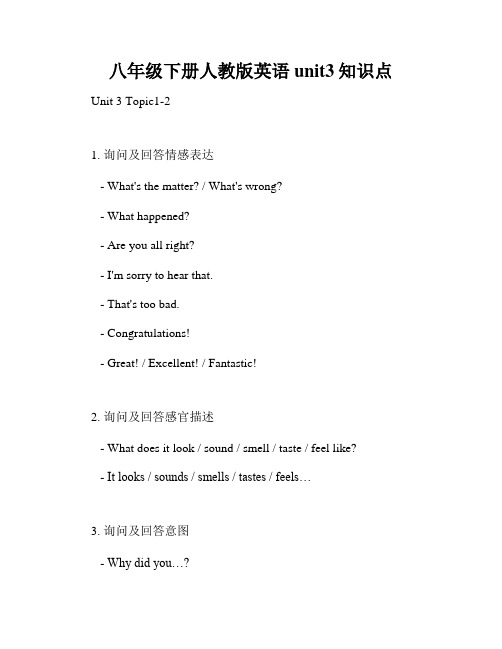
八年级下册人教版英语unit3知识点Unit 3 Topic1-21. 询问及回答情感表达- What's the matter? / What's wrong?- What happened?- Are you all right?- I'm sorry to hear that.- That's too bad.- Congratulations!- Great! / Excellent! / Fantastic!2. 询问及回答感官描述- What does it look / sound / smell / taste / feel like?- It looks / sounds / smells / tastes / feels…3. 询问及回答意图- Why did you…?- What are you going to …?- What do you intend to…?- I intend to… / I plan to…4. 问路及指路,口语表达中熟悉的方向词汇- Excuse me, could you tell me the way to…?- How can I get to…?- The nearest bus stop / subway station / bank / post office is… - It's on the left / right / opposite…Unit 3 Topic 3-41. 表达偏好及兴趣- Would you like…?- What kind of…do you like?- Do you prefer…to…?- I'm into…- I'm fond of…- I enjoy…2. 指出和辨认物品及人物(描述外貌和服装)- What does he / she look like?- He / She has…(描述头发颜色、眼睛、身材特征、穿戴等)3. 询问及描述活动安排- What are you going to do…?- What will you do…?- I'll…4. 描述天气- What's the weather like today?- It's sunny / cloudy / rainy / snowy / windy…- It's hot / warm / cool / cold…Unit 3 Topic 5-61. 表示和理解时间和星期- What time is it?- What's the date today?- What day is it today?- How many days are there in a week?- What do you usually do on weekends?2. 描述行程及活动- Tomorrow, I'm going to…(描述行程)- On Monday / Tuesday / Wednesday…, I usually… - In the morning / afternoon / evening / at night…, I…3. 询问及回答感受- How do you feel?- I feel…(描述感受)4. 描述位置- Where is the…? It's…(描述方位)以上是八年级下册人教版英语unit3的知识点总结,有效巩固这些知识点,可以让你在英语学习中更加得心应手。
人教版八年级英语下册第三单元知识点汇总总结
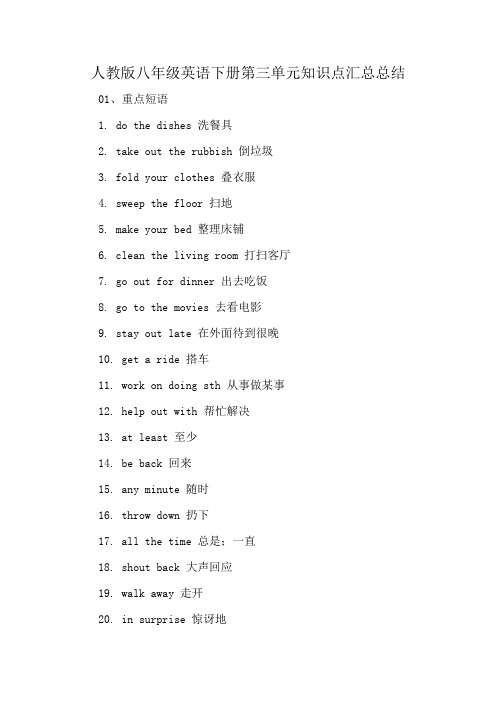
人教版八年级英语下册第三单元知识点汇总总结01、重点短语1. do the dishes 洗餐具2. take out the rubbish 倒垃圾3. fold your clothes 叠衣服4. sweep the floor 扫地5. make your bed 整理床铺6. clean the living room 打扫客厅7. go out for dinner 出去吃饭8. go to the movies 去看电影9. stay out late 在外面待到很晚10. get a ride 搭车11. work on doing sth 从事做某事12. help out with 帮忙解决13. at least 至少14. be back 回来15. any minute 随时16. throw down 扔下17. all the time 总是;一直18. shout back 大声回应19. walk away 走开20. in surprise 惊讶地21. share the housework 分担家务22. a waste of time 浪费时间23. in order to 为了24. depend on 依赖;依靠25. look after/ take care of 照顾26. as a result 结果02、重点句子Grammar Focus 句子1. Could I go out for dinner with my friend?我可以和我的朋友们一起去外面吃晚饭吗?Sure, that should be OK.当然,那没问题。
2. Could we get something to drink after the movie? 看完电影后我们可以喝些东西吗?No, you can't. You have a basketball game tomorrow. 不,你不可以。
人教版八年级英语下册UNIT3整单元知识点汇总
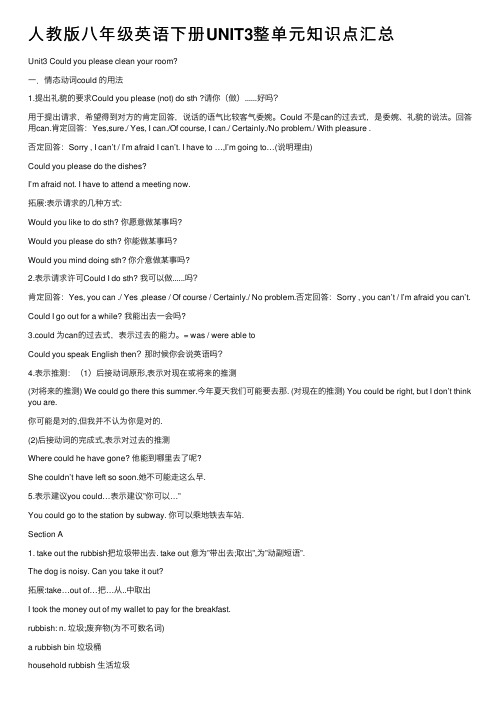
⼈教版⼋年级英语下册UNIT3整单元知识点汇总Unit3 Could you please clean your room?⼀.情态动词could 的⽤法1.提出礼貌的要求Could you please (not) do sth ?请你(做)......好吗?⽤于提出请求,希望得到对⽅的肯定回答,说话的语⽓⽐较客⽓委婉。
Could 不是can的过去式,是委婉、礼貌的说法。
回答⽤can.肯定回答:Yes,sure./ Yes, I can./Of course, I can./ Certainly./No problem./ With pleasure .否定回答:Sorry , I can’t / I’m afraid I can’t. I have to …,I’m going to…(说明理由)Could you please do the dishes?I’m afraid not. I have to attend a meeting now.拓展:表⽰请求的⼏种⽅式:Would you like to do sth? 你愿意做某事吗?Would you please do sth? 你能做某事吗?Would you mind doing sth? 你介意做某事吗?2.表⽰请求许可Could I do sth? 我可以做......吗?肯定回答:Yes, you can ./ Yes ,please / Of course / Certainly./ No problem.否定回答:Sorry , you can’t / I’m afraid you can’t.Could I go out for a while? 我能出去⼀会吗?3.could 为can的过去式,表⽰过去的能⼒。
= was / were able toCould you speak English then?那时候你会说英语吗?4.表⽰推测:(1)后接动词原形,表⽰对现在或将来的推测(对将来的推测) We could go there this summer.今年夏天我们可能要去那. (对现在的推测) You could be right, but I don’t think you are.你可能是对的,但我并不认为你是对的.(2)后接动词的完成式,表⽰对过去的推测Where could he have gone? 他能到哪⾥去了呢?She couldn’t have left so soon.她不可能⾛这么早.5.表⽰建议you could…表⽰建议”你可以…”You could go to the station by subway. 你可以乘地铁去车站.Section A1. take out the rubbish把垃圾带出去. take out 意为”带出去;取出”,为”动副短语”.The dog is noisy. Can you take it out?拓展:take…out of…把…从..中取出I took the money out of my wallet to pay for the breakfast.rubbish: n. 垃圾;废弃物(为不可数名词)a rubbish bin 垃圾桶household rubbish ⽣活垃圾Don’t throw rubbish everywhere.4. sweep the floor扫地,sweep为及物动词,过去式和过去分词均为swept. He pick up the broom to help me sweep the floor.含sweep的常⽤短语:Sweep away 消灭;彻底消除Sweep up 打扫;清扫Sweep out 打扫⼲净;清扫⼲净Sweep aside 对….置之不理;全然⽆视5.floor 名词,地板.Why is my coat on the floor?Floor作名词还可意为”楼层”Our office is on the top floor.注意:在英式英语中the ground floor 指第⼀层,the first floor 指第⼆层.美式英语中,the first floor指第⼀层,the second floor 指第⼆层.9. go to the movies去看电影10. stay out late/ until nine呆到很晚/ 呆到9点钟11. get a ride撘车12. give sb a ride to town开车送某⼈到镇上13. need to do sth需要做……14. have to do sth不得不做……15. help out with a few things帮助做些事情16. could I at least finish watching this show?可以⾄少让我看完这个节⽬吗?at least⾄少,多指数量或程度上的最低限度。
- 1、下载文档前请自行甄别文档内容的完整性,平台不提供额外的编辑、内容补充、找答案等附加服务。
- 2、"仅部分预览"的文档,不可在线预览部分如存在完整性等问题,可反馈申请退款(可完整预览的文档不适用该条件!)。
- 3、如文档侵犯您的权益,请联系客服反馈,我们会尽快为您处理(人工客服工作时间:9:00-18:30)。
人教版丨八年级下册英语3单元知识点总结Unit3 Could you please clean your room?【重点单词】rubbish [ˈrʌbɪʃ] n. 垃圾,废物take out the rubbish 倒垃圾fold [fəʊld] v. 对折,折叠mess [mes] n. 混乱,脏乱,食堂throw [θrəʊ] v. 扔,投掷all the time 频繁,反复neither [ˈni:ðə] pron.adv. 二者都不;也不shirt [ʃə:t] n. 运动衫,衬衫as soon as 一…就…,尽快pass [pɑ:s] v. 前行,经过,批准borrow ['bɒrəʊ] v. 借,借用lend [lend] v. 借给,借出finger [ˈfiŋgə(r)] n. 手指hate [heɪt] v. 憎恶,讨厌chore [tʃɔ:(r)] n. 杂务,乏味的工作while [wail] conj. 当...时候,而,然而snack [snæk] n. 小吃,点心,快餐stress [stres] n. 精神压力,心理负担waste [weɪst] v. 浪费,消耗in order to 目的是,为了provide [prə'vaid] v. 提供,供给,供应anyway [ˈeniwei] adv. 无论如何,不管怎样,而且depend [diˈpend] v. 取决于,依靠,依赖depend on 依靠于develop [dɪˈveləp] v. 发展,壮大,开发,研制independent [ˌindiˈpendənt] adj. 独立自主的,不受约束的independence [ˌɪndɪ'pendəns] n. 独立fair [fɛə] adj. 公平的,公正的unfair [ˌʌnˈfeə] adj. 不公平的,有偏见的fairness [ˈfeənɪs] n. 公正性,合理性since [sɪns] conj. 因为,既然neighbor [ˈneɪbə] n. 邻居take care of 照顾,处理ill [il] adj. 生病的,有病的drop [drɔp] v. 落下,跌落【重点短语】1.go out for dinner 出去吃饭2.stay out late 在外面待到很晚3.go to the movies 去看电影4.get a ride 搭车5.work on 从事6.finish doing sth. 完成做某事7.clean and tidy 干净整洁的8.do the dishes 洗餐具9.take out the rubbish 倒垃圾10.fold your/the clothes 叠衣服11.sweep the floor 扫地12.make your/the bed 整理床铺13.clean the livng room 打扫客厅14.no problem 没问题15.welcome sb. 欢迎某人e home from school/work放学/下班回家17.throw down 扔下18.sit down 坐下e over 过来20.take sb. for a walk 带某人去散步21.all the time 一直;总是22.all day/evening 整曰/夜23.do housework 做家务24.shout back 大声回应25.walk away 走开26.share the housework 分担家务27.a comfortable home 一个舒适的家28.in surprise 惊讶地29.get something to drink 拿点喝的东西30.watch one show 观看一个节目31.hang out 闲逛32.pass sb. sth. 把某物传给某人33.lend sb. sth. 把某物借给某人34.get sth. wet 使某物弄湿35. hate to do sth. 讨厌做某事36.do chores 做杂务37.help sb. (to ) d o /with sth.帮助某人干某事38.bring a tent带顶帐篷来39.buy some snacks买些小吃40.go to the store去商店41.invite sb. to a party邀请某人参加聚会42.make sb. do sth. 使某人做某事43.enough stress足够的压力44.a waste of time浪费时间45.in order to为了46.get good grades取得好成绩47.mind doing sth. 介意做某事48.depend on依赖;依靠49.develop children ’s independence发展孩子的独立性50.look after/take care of 照顾;照看51.do one’s part in (doing ) sth. 做某人分内的事【重点句型】1.Could you please clean your room?你能打扫一下你的房间吗?2. I have to do some work. 我必须干些活。
3. Could I use your computer?我可以用一下你的电脑吗?4. She won't be happy if she sees this mess. 如果她看到这样乱七八糟的话,她会不高兴的。
5. For one week, she did not do any housework and neither did I. 整整一周,她什么家务活都不干了,我也一样。
6. My mom came over as soon as I sat down in front of the TV .我一在电视机前坐下,我妈妈就过来了。
7. I hate to do chores. 我不喜欢做杂务。
特殊句型:1、as ---as---(与---一样):用于同级比较。
第一个as为副词,后跟形容词或副词的原级;第二个为连词,引导比较状语从句。
否定形式:not as/so ---as---,不如----2、neither+连系动词be/助动词/情态动词+主语……(也不。
)这是一个倒装句,表示上句否定的情况也同样适合后者。
3.So+连系动词be/助动词/情态动词+主语----也是。
这是一个倒装句,表示上句肯定的情况也同样适合后者。
拓展:neither+主语+连系动词be/助动词/情态动词----的确不是这样。
(表示说话者同意上文中说话者的否定观点。
)4.So+主语+连系动词be/助动词/情态动词-----的确是这样。
表示说话者同意上述说话者说出的观点。
1、do one’s part in (doing ) sth 尽某人的职责做某事。
2、The+比较级,the+比较级(表示越……,就越……)比较级+比较级(表示越来越……)重点语法can 的用法:1)请求别人时通常用此句型,也可以说:Can you...please?情态动词could或can在这里均表示请求,在意思上无区别,但是用could在于其上显得更委婉、客气、诚恳。
在日常生活中常使用could you/I...?若在句末加上please,则显得更礼貌。
Could you help me find my book,please?你能帮我找到我的书吗?(2)对could you/I...?的问句作出肯定回答,常用“sure/certainly/of course”等;如果作否定回答,常用“sorry或oh,please don’t”。
一般不用no开头,用no显得语气生硬、不礼貌。
(3)表示请求的句式:Would you like to do...? Would you mind doing...? Let’s do.... Shall I/we do...?Please do...(祈使句前加please)提示:could you please...与could I Please...两种问句,前者是请求别人帮忙的句式,后者是有礼貌地向别人请求允许的交际用语。
试比较:Could you please help me?请你帮我一下好吗?Could I please invite my friends to my birthday party,Mom? 妈妈,我能邀请我的朋友参加我的生日聚会吗?2. could的用法:(1).can的过去式,意为“能、会”,表示能力时一般译为“能、会”,即有种能力,尤其是生来具备的能力,此时may 和must 均不可代替它。
如:She can swim fast, but I can’t . 她能游得很快,但我不能。
I can see with my eyes. 我用眼睛看。
(2). could在疑问句中,表示委婉的语气,此时could 没有过去式的意思。
如:Could you do me a favour? 你能帮我个忙吗?—Could I use your pen? 我能用一下你的钢笔吗? —Yes, you can.可以。
(注意回答)常用于否定句和疑问句中,此时can’t 译为“不可能”。
—Can it be our teacher?那个人有可能是我们老师吗?—No, it can’t be our teacher. He is on a visit to the Great Wall.不可能。
咱们老师正在游览长城呢。
【单元作文】【话题:做家务和请求许可】以家务、杂务为话题,掌握情态动词could表示委婉地请求许可的用法。
结合本单元短文所讲内容“青少年在家应不应该做家务”,要求同学们会写有关议论的短文。
范例1 ★★★Last Saturday morning, my parents went out to visit their friends. After breakfast, I did the dishes. After that, I began to clean the living room. I swept the floor, cleaned the window and took out the rubbish. At around 11:00, I began to cook lunch. When my parents came back home, they saw the clean living roomand some delicious food. They were very happy and said to me, “Dear, you really did a good job! Thank you.”范例2 【Unit 3单元测试范文】★★★Dear Sandy,I am going to have a birthday party at my house next Saturday. I have to prepare for the party and I need your help. Could you please help me do the following things? Call some friends and invite them to the party. Helpme clean the room before the party. Prepare some food and drinks for the party. And after the party, help me take out the rubbish. Hope to hear from you soon.Yours, Nancy。
